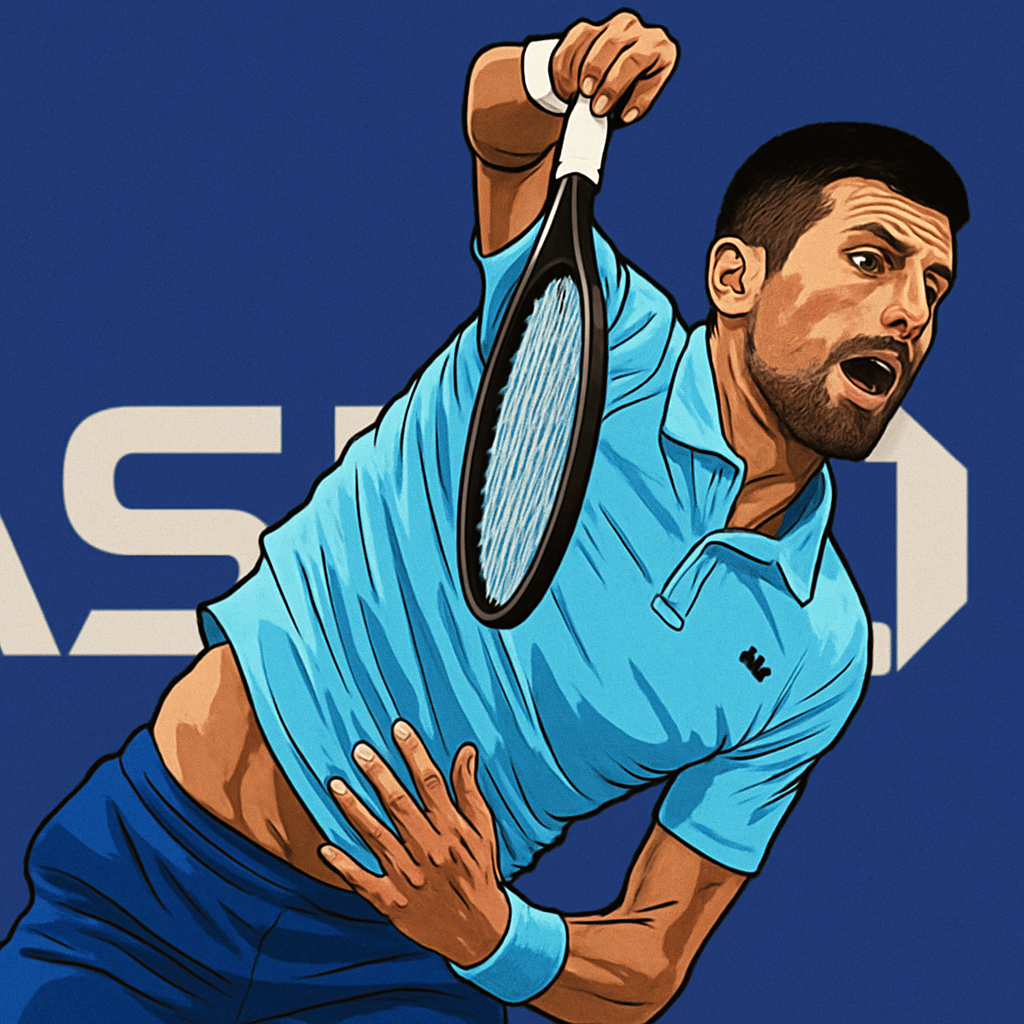NEW YORK — Novak Djokovic advanced to the US Open third round on Thursday night, but the journey was far more arduous than anyone anticipated.
The world No. 1 and 23-time Grand Slam champion was pushed to the brink by American qualifier Zachary Svajda, ranked 121st in the world, before ultimately prevailing 6-4, 5-7, 6-1, 6-1 in a match that lasted two hours and 59 minutes inside Arthur Ashe Stadium.
For a set and a half, the 20-year-old Californian, playing with the fearless abandon of a man with nothing to lose, matched the legendary Serbian shot for shot, even breaking serve to take the second set and level the match.
It was a scenario few could have predicted, yet Djokovic, as he has done so many times throughout his storied career, found a way to recalibrate, elevate his game, and extinguish the threat.
A Slow Start and a Spirited Challenge
From the outset, there was a palpable sense that Djokovic was not operating at his razor-sharp best. While his movement and defense remained elite, his trademark precision and first-serve efficiency were uncharacteristically absent.
Svajda, a two-time USTA Boys’ National champion, seized the opportunity. He played clean, aggressive tennis from the baseline, refusing to be intimidated by the occasion or the opponent across the net.
The critical moment came late in the second set. With Djokovic serving at 5-6, Svajda unleashed a series of blistering returns and passing shots, breaking the second seed to love and sending a jolt of electricity through the New York crowd.
The underdog had drawn level, and suddenly, the prospect of a monumental upset felt very real. Djokovic walked to his chair, shook his head, and engaged in a tense, animated discussion with his coaching team.
The Djokovic Response: Flipping the Switch
What followed was a masterclass in problem-solving and mental fortitude. The intermission between the second and third sets served as a hard reset for the top seed. He emerged a different player.
The errors that had plagued his game vanished. His first-serve percentage skyrocketed. Most importantly, he began to systematically break down Svajda’s game, exploiting the American’s weaker backhand wing and moving him relentlessly around the court.
The third set was a demolition, wrapped up in just 33 minutes. The fourth set followed a nearly identical script, with Djokovic winning the final nine games of the match in a breathtaking display of dominance.
The statistics told the story of the turnaround. After the second set, Djokovic made only six unforced errors across the final two sets, a stark contrast to the 21 he had committed in the first two.
Post-Match Reflections: A Champion's Honest Assessment
In his post-match press conference, Djokovic was candid about his struggles and the process of finding a solution mid-match. He admitted, "I did not feel that great. I was not striking the ball as well as I normally do."
He elaborated on the mental challenge, stating, "You have to try to find a way to win. It's not always possible, but today it was. I'm trying to be honest with myself and with you guys, I was not playing well at all."
The 36-year-old was full of praise for his young opponent, acknowledging the quality of his play. "Credit to Zachary for playing really well. He was making me work, making me run," Djokovic said.
He pinpointed the key adjustment that turned the tide: "I had to step it up. I had to be more aggressive. I was trying to solve the riddle, to be honest."
Looking Ahead: The Path Gets Tougher
With the victory, Djokovic sets up a third-round clash against his compatriot, Laslo Djere, the 32nd seed. Djere presents a familiar and formidable challenge, having taken Djokovic to three tight sets just weeks ago in Belgrade.
The narrow escape against Svajda serves as a stark reminder that even the greatest champions are vulnerable in the early rounds of a major, especially when they are not at their peak.
For Djokovic, the match provided a valuable test and a clear blueprint of what he needs to improve. His ability to raise his level when it matters most remains his greatest weapon.
As he pursues a record-breaking 24th Grand Slam title, which would tie Margaret Court for the most all-time, every match is a step into history. The challenges will only get tougher from here.
Key Takeaways from the Match
Djokovic’s victory, while ultimately convincing, revealed several important narratives for the rest of his tournament:
- Vulnerability Exists: The match proved that Djokovic is not invincible. A confident, aggressive player can disrupt his rhythm and seize control of points.
- The Problem-Solver: His capacity to diagnose issues mid-match and implement a new strategy is arguably unmatched in the history of the sport.
- Physical Dominance: Even at 36, his physical conditioning allowed him to wear down a much younger opponent over the course of a long match.
- Serve as a Barometer: When his first serve is firing, he is nearly unplayable. When it’s off, as it was early on, matches become complicated.
Conclusion: A Warning and a Statement
Novak Djokovic’s four-set victory over Zachary Svajda was a tale of two matches. For two sets, it was a warning sign, a glimpse of mortality for the tournament favorite.
For the final two sets, it was a statement—a ruthless reminder of the champion’s mentality that has defined his career. He was "trying to solve the riddle," and once he did, the outcome was never in doubt.
The US Open is a marathon, not a sprint. While other contenders may be cruising through early rounds, Djokovic has already been battle-tested, a experience that often proves invaluable in the second week of a Grand Slam.
As he moves forward, the quest for 24 continues, and the tennis world is once again left in awe of his ability to find a way to win, even when he is not at his absolute best.

